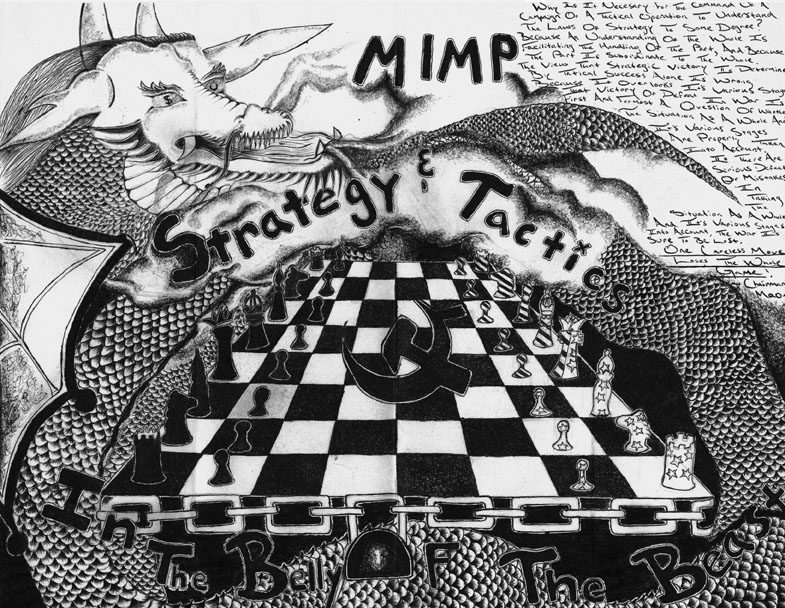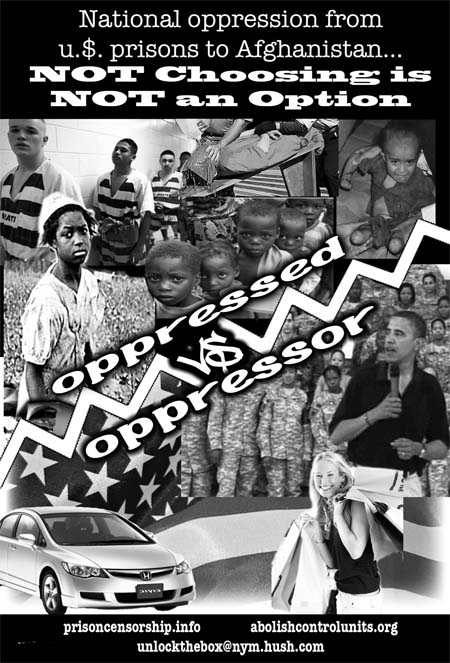
Comrades in MIM(Prisons) and United Struggle from Within (USW) have been
studying diligently to solidify and advance the line, strategy and
tactics of the anti-imperialist prison movement. This issue of Under
Lock & Key will introduce this discussion, while focusing on
strategies utilizing the bourgeois legal system. In the imperialist
countries we face a strategic period where our battles are legal ones as
we build our organization and infrastructure.
In March 2010, MIM(Prisons) recorded its 1000th incident of censorship
in the u.$. prison system. And this is just a small sample of the
repression that goes on in the belly of the beast. The strategy behind
our legal battles is two pronged: 1) when we win we create more space to
do the organizing work that is much needed in the movement, and 2) when
we lose we build public opinion about the reality that there are no
rights, only power struggles, and what real power looks like. Therefore,
if done well, every battle moves us forward.
Organizationally, we stand at a juncture where MIM(Prisons) has
established itself with a consistent practice, while upholding the
political line developed by the Maoist Internationalist Movement.
Meanwhile, our allies stand ready to do more to organize the movement.
This includes our comrades in the anti-imperialist prisoner
organization, United Struggle from Within, which is led by MIM(Prisons),
as well as other lumpen organizations at various levels of political
development.
As a result, we are focusing on the need to build an anti-imperialist
United Front through our work in the prison movement. We are making a
call to all lumpen and prison-based organizations who believe in the
need for self-determination of all nations to join us in developing this
United Front on the basis of some key principles. MIM(Prisons), USW and
others are already hashing out these principles, and we want to make
sure that it is as agreeable yet powerful as it can be.
Theoretically, we stand on the legacy of decades of struggle and
political line development led by MIM. By studying their work, we are
able to leap forward theoretically, as each generation must do by
learning from the previous. There are some theoretical questions we will
be developing further in future months, both in the pages of Under
Lock & Key and in larger publications we plan to publish.
We will continue to explore important aspects of strategy for months to
come. We begin here with some definitions to help our readers grasp and
participate in this discussion.
Definitions
Imperialism: the global economic system that exists
today. First World corporations have expanded to the point where they
must invest money overseas to continue to grow, so they export their
capital to the Third World. These foreign investments in Third World
economies, safeguarded by military force, stifle the growth of the local
bourgeois classes. With no national bourgeoisie, or a weak one at best,
a national economy is unable to grow. Imperialist investment then
ensures its own dominance by paying dirt wages to workers who have no
options, and enjoying the freedom to escape local taxes and
environmental restrictions.
Anti-Imperialism: the belief that nations have the
right to struggle for liberation when faced with oppression by other
nations. Opposing imperialism means opposing the system where some
nations use their power to exploit other nations’ wealth. Imperialism
stifles all indigenous economic and political activity.
Anti-imperialists work to release local development forces to better
meet the needs of the people.
Nation: a group of people on one connected piece of
land with a common economy, language, and national psychology.
Principal Contradiction: the highest priority
contradiction that communists must focus their energy on for a long
period of time - a strategic period. The concept of the principal
contradiction comes from dialectical materialism, which says that
everything can be divided into two opposing forces. These contradictions
are the basis for any changes that thing goes through. Defining the
principal contradiction is a crucial step to developing ones political
line.
The principal contradiction in the world today is between the
imperialist countries and the countries they oppress and exploit. Based
on this fact, we say the principal task is to build public opinion
against imperialism and to build institutions of the oppressed that are
independent of imperialism, in order to seize power from the
imperialists.
Anti-Imperialist United Front: the loose alliance of
classes and parties that work to undermine imperialist domination. To
achieve our principal task, we must unite all who can be united on the
side of the oppressed against imperialism. Developing an
anti-imperialist united front, is facilitating the growth of the winning
side of the principal contradiction in the world today.
Internationalism: ethical belief or scientific approach
in which peoples of different nations are held to be or assumed to be
equal.
Line: Line is generally a belief, but line can also be
a goal. For instance, our belief is that only through communism can we
abolish the oppression of groups of people over other people. At the
same time it is our goal to abolish the oppression of people over other
people.
Strategy: our long-term plans to get to various goals
on the way to communism. For every stage in the revolutionary struggle,
there is a strategy.
Strategic Confidence: the belief that the proletarian
forces will win based on a concrete analysis of society. Our strategic
confidence comes from an analysis of the contradictions within
imperialism, which are bringing about its own decay and destruction. As
a minority within the united $tates, the oppressed and progressive
forces have a hard time developing strategic confidence when focused
narrowly on local events and struggles. Therefore, internationalism is a
must for the oppressed nations in the united $tates to obtain liberation
from imperialism, which threatens to further immiserate and oppress a
growing segment of society as crisis ensues and fascism knocks on the
door.
Tactics: Short-term plans, some of which may be used
again and again in slightly different circumstances. Tactics are short
term and flexible based on day-to-day changes in the situation.
Rightism: In general, rightists tend to be too
conservative. A rightist is someone who tends to make everything a
matter of tactics. Rightists don’t care about long-term goals or plans.
Ultra-leftism: Ultra-leftists will tend to judge
real-world revolutionaries in the light of principles that only
Jesus/Moses/Muhammad-type figures could implement. Ultra-leftism thus
smacks of religion/idealism. The ultra-left also tends to go to extremes
to achieve their objectives.
(note: Rightism and Ultra-leftism are both errors WITHIN the
revolutionary movement. We are not talking about the “right” and “left”
wings of the amerikan government commonly referred to in the bourgeois
press.)
Proletarian Morality: Proletarian morality is based in
the basic concept of doing no wrong in the masses’ eyes, but it also
goes further than this. It means implementing certain codes of conduct
within the party to which all party members must strictly adhere to.
This means that we cannot do anything which the masses could see as
morally wrong, such as accepting gratuities in exchange for favors, or
stealing from the masses. Proletarian morality is not idealist, but
recognizes what needs to be done to create a more just world. Pacifists
apply an idealist form of morality by saying that violence is never
justified. Similarly, anarchists denounce hierarchy and oppression in
the hands of the oppressed, even if used as tools to destroy hierarchy
and oppression in the bigger picture.
Pragmatism: a philosophy of going forth without theory
or line, utilizing wishy washy strategies, and pushing tactics from that
thinking. Instead of seeing the whole they see the part. Pragmatists
react to a situation, rather than analyze it and address the real
problem.
Empiricism: the belief that knowledge is derived from
experience through direct observation of phenomena. In contrast, we
recognize that 99% of practice is now history and not things that we
will experience directly.
Dogmatism: the belief in, or promotion of ideas without
basis in fact or without depth. Dogmatists are stubborn, and view things
arrogantly and narrow-mindedly.
notes: most of the definitions above came from study and discussion
of MIM Theory 5: Diet for a Small Red Planet,
download
pdf











 Download
PDF, Print and Distribute
Download
PDF, Print and Distribute